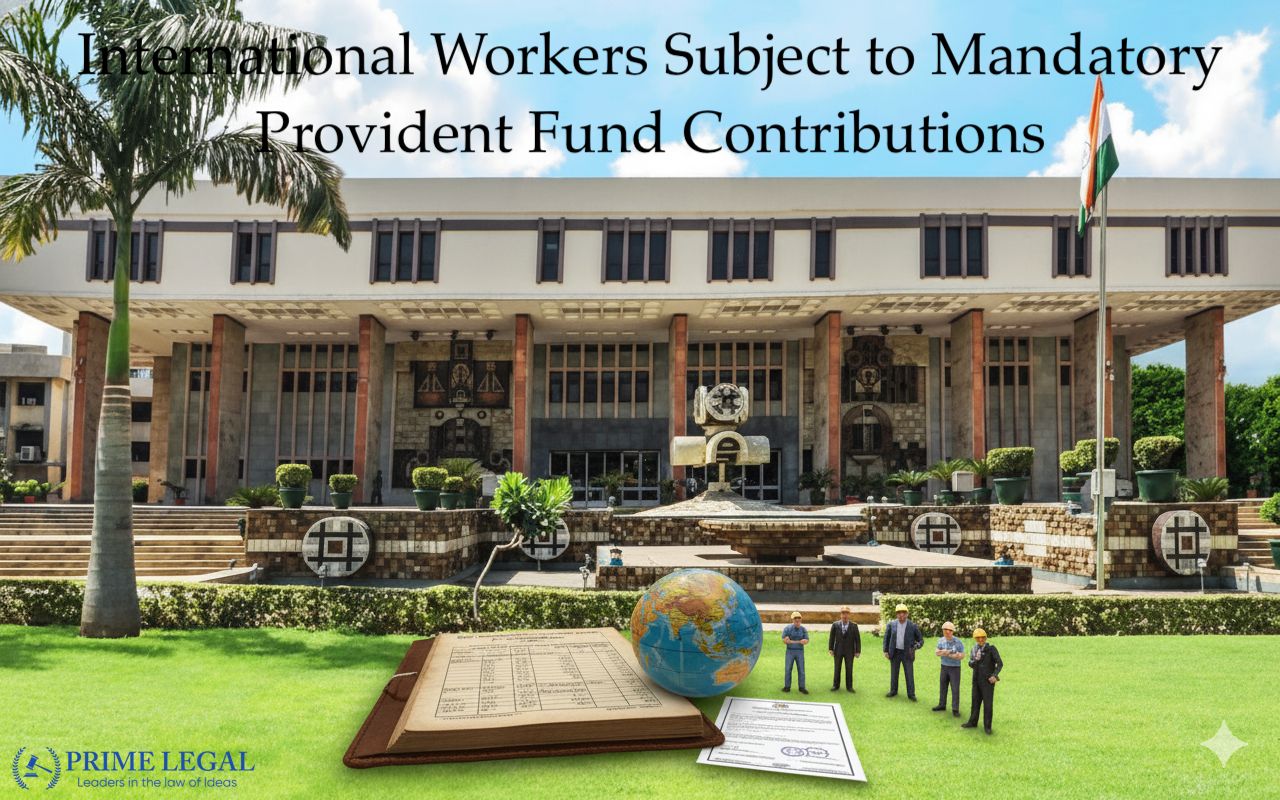INTRODUCTION
The Hon’ble Delhi High Court has ruled that international workers employed in Indian establishments who are not covered by any social security scheme in their home countries must enrol in and contribute to the Employees’ Provident Fund (EPF). The bench consisting of Chief Justice of Delhi High Court Justice Devendra Kumar Upadhyaya and Justice Tushar rao Gedela delivered the judgement on 4th day of November, 2025 which dismissed the petition filed by Spice Jet Ltd. and LG Electronics India Pvt. Ltd.
The Court validated the two Central Government notifications – GSR 706(E) dated 1st Day of October, 2008 and GSR 148(E) dated 3rd Day of September, 2010 which was issued under the Employees’ Provident Fund and Miscellaneous Provisions Act, 1952. These amendments have been introduced in paragraph 83 in the Employees’ Provident Fund Scheme, 1952 which states that the international workers are required to become members of the Fund, extending the scope of India’s security framework to foreign nationals employed in India.
BACKGROUND
The petitioners in this matter argued that applying the Employees’ Provident Fund Scheme to international employees without salary exemptions was arbitrary and discriminatory under Article 14 of the Constitution of India. Their main contention was Indian workers earning above Rs. 15,000 per month were exempt, whereas foreign workers had to contribute to the Fund regardless of the income.
They even argued on the restriction on the withdrawal of funds only after reaching the age of 58 or in case of permanent incapacity stating that it is very unreasonable for the foreign employees who stay in India for a very short period of time.
The Court and the Employees’ Provident Fund Organisation (EPFO) stated that the differentiation is rationale based on economic duress which the Indian employees face unlike the international employees who stay for a shorter period of time of about 2 – 5 years.
KEY POINTS
- The Court held that Sections 5 and 7 of the Employees’ Provident Fund (EPF) Act, 1952 gives power to the Central Government to modify and extend the Scheme to new class of employees, including the international employees. Hence paragraph 83 of EPF Scheme is legally valid and will fulfil India’s Obligations by ensuring that employees from countries without a reciprocal Social Security Agreement (SSA) or with whom India has not entered into a bilateral comprehensive economic agreement, still enjoy social protection while working in India.
- The differentiation in the monthly payment of the Indian and foreign employees was stated as justified as Indian workers could face more financial burden if forced to contribute irrespective of the income, while international employees would not suffer such economic hardship who stays for only a short period of time.
- The court stated that, there is no violation of Article 14 of the Constitution of India as argued by the petitioner. The distinction between Indian and foreign employees was to serve the legitimate objective of extending social security coverage and is not arbitrary or discriminatory.
- Allowing of withdrawals only upon reaching the age of 58 or in case of permanent disability was deemed valid on the grounds that early withdrawal could undermine the purpose of a provident fund as a long – term social security mechanism.
RECENT DEVELOPMENTS
The Hon’ble Delhi High Court’s decision in this case Spice Jet Ltd. v. Union of India [W.P.(C) 2941/2012] represents the development over the application of India’s Employees’ Provident Fund Scheme to international employees who work in India. In Stonehill Education Foundation v. Union of India (2024 SCC OnLine Kar 49) the judgement passed by Karnataka High Court had reasoned that imposing provident fund obligations on foreign employees irrespective of their salary, while exempting high-income Indian employees, lacked a rational nexus and amounted to hostile discrimination. The Delhi High Court, however, departed from this view, by disagreeing with the reasoning given by the Court stating that distinction is valid as Indian employees could face economic burden if obligated to contribute regardless of income, whereas foreign employees will not be affected as they serve for only a short period of time.
The petitioners had also relied on precedents such as Union of India v. N.S. Rathnam & Sons (2015) 10 SCC 681 and Indian Express Newspapers (Bombay) Pvt. Ltd. v. Union of India (1985) 1 SCC 641 to argue that delegated legislation cannot exceed statutory limits. However, the Court distinguished those rulings, holding that the Central Government acted within its powers under Sections 5 and 7 of the EPF Act,1952.
CONCLUSION
By dismissing the petition the Delhi High Court showed the Government’s authority to extend the EPF Scheme to foreign employees working in India even in absence of reciprocal SSA or with whom India has not entered into a bilateral comprehensive economic agreement. This judgment shows India’s commitment to ensuring universal social security coverage and upholding its international obligations.
“PRIME LEGAL is a full-service law firm that has won a National Award and has more than 20 years of experience in an array of sectors and practice areas. Prime legal falls into the category of best law firm, best lawyer, best family lawyer, best divorce lawyer, best divorce law firm, best criminal lawyer, best criminal law firm, best consumer lawyer, best civil lawyer.”
WRITTEN BY- SUSMITA ROYCHOWDHURY


